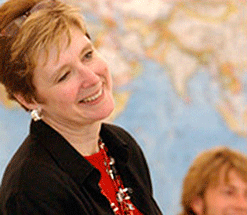Professor Kraly Speaks to the Place of Gender in Forced Migration

On Thursday, January 29, the Social Science department hosted a Brown Bag event titled, “Behind and Beyond Disaggregation by Sex: The Place of Gender in the Demography of Forced Migration.”
William R. Kenan Jr. Professor of Geography and Environmental Studies and Director of Environmental Studies Ellen Percy Kraly discussed the causes and common patterns that lead to forced migration, specifically of women and children in third world countries.
Kraly argued that gender informs our understanding of the demography of forced migration. Her use of both quantitative and qualitative theory and research allowed her to effectively highlight pre-migration and post-migration trends within refugee populations.
Kraly has dedicated her academic and professional career to this topic through many academic papers – including the paper from which her lecture stemmed – and participation in many conferences, such as the International Seminar on Demographic Perspectives on Refugee and Forced Migration at the University of Tehran in May 2012, to which she referred in her lecture.
Following the presentation of her overall argument, Kraly introduced the ways in which data can be categorized in order to spot distinct patterns within migrant groups. These categories included age, location, mortality rate and presence of domestic violence, among others.
“80 percent of most refugee populations are comprised of women and children under the age of 18,” Kraly said.
Kraly spoke of the lack of longitudinal data collected by the international community surrounding these fluid populations. She explained how it is imperative to not only allocate limited resources to the collection of data in order to better understand the causes of forced migration, but also to provide these refugees with the tools and aid that would reduce their need to migrate in the first place.
“The international community frequently fails in providing long term resolutions to those violent conflicts that lead to migration,” Kraly said.
In reference to the causes of forced migration, Professor Kraly explained how her research focuses on response to human conflict and violence.
This is due to the lack of data reflecting migration based on abrupt environmental changes, a cause she mentions as present but under-researched.
To close her lecture, Kraly responded to questions from the audience, expanding on her thoughts regarding why this kind of research and data analysis is important and who it benefits.
“What is the cost of not knowing the data and why is it difficult to actually obtain the data itself?” Professor of Geography and Asian Studies Dai Yamamoto asked.
In response to this question, Kraly addressed two main points: correct resource allocation and obtaining valuable information. In order to provide these women with necessary medical personnel, water, food and other vital survival resources, the exact needs and risks of these migrants need to be understood.
Generating this kind of information, Kraly mentioned, will also help the international community understand related issues including unintended pregnancy and domestic violence within these populations.



